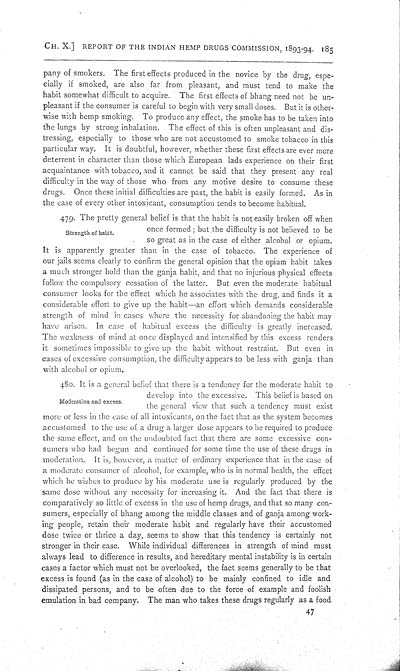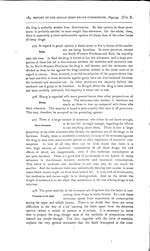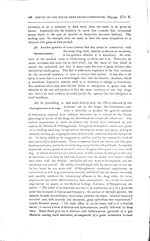Medicine - Drugs > Report of the Indian Hemp Drugs Commission, 1894-1895 > Volume I
(216) Page 185
Download files
Individual page:
Thumbnail gallery: Grid view | List view

CH. X.] REPORT OF THE INDIAN HEMP DRUGS COMMISSION, 1893-94. 185
pany of smokers. The
first effects produced in the novice by the drug, espe-
cially if smoked, are also far from pleasant, and must tend to make
the
habit somewhat difficult to acquire. The first effects of bhang
need not be un-
pleasant if the consumer is careful to begin with very small doses.
But it is other-
wise with hemp smoking. To produce any effect, the smoke has to be
taken into
the lungs by strong inhalation. The effect of this is often
unpleasant and dis-
tressing, especially to those who are not accustomed to smoke
tobacco in this
particular way. It is doubtful, however, whether these first
effects are ever more
deterrent in character than those which European lads experience on
their first
acquaintance with tobacco, and it cannot be said that they present
any real
difficulty in the way of those who from any motive desire to
consume these
drugs. Once these initial difficulties are past, the habit is
easily formed. As in
the case of every other intoxicant, consumption tends to become
habitual.
Strength of habit.
479. The pretty general
belief is that the habit is not easily broken off when
once formed; but the
difficulty is not believed to be
so great as in the case of either alcohol or opium.
It is apparently greater than in the case of tobacco. The
experience of
our jails seems clearly to confirm the general opinion that the
opium habit takes
a much stronger hold than the ganja habit, and that no injurious
physical effects
follow the compulsory cessation of the latter. But even the
moderate habitual
consumer looks for the effect which he associates with the drug,
and finds it a
considerable effort to give up the habit—an effort which demands
considerable
strength of mind in cases where the necessity for abandoning the
habit may
have arisen. In case of habitual excess the difficulty is greatly
increased.
The weakness of mind at once displayed and intensified by this
excess renders
it sometimes impossible to give up the habit without restraint. But
even in
cases of excessive consumption, the difficulty appears to be less
with ganja than
with alcohol or opium.
Moderation and excess.
480. It is a general
belief that there is a tendency for the moderate habit
to
develop into the excessive.
This belief is based on
the general view that such a tendency must exist
more or less in the case of all intoxicants, on the fact that as
the system becomes
accustomed to the use of a drug a larger dose appears to be
required to produce
the same effect, and on the undoubted fact that there are some
excessive con-
sumers who had begun and continued for some time the use of these
drugs in
moderation. It is, however, a matter of ordinary experience that in
the case of
a moderate consumer of alcohol, for example, who is in normal
health, the effect
which he wishes to produce by his moderate use is regularly
produced by the
same dose without any necessity for increasing it. And the fact
that there is
comparatively so little of excess in the use of hemp drugs, and
that so many con-
sumers, especially of bhang among the middle classes and of ganja
among work-
ing people, retain their moderate habit and regularly have their
accustomed
dose twice or thrice a day, seems to show that this tendency is
certainly not
stronger in their case. While individual differences in strength of
mind must
always lead to difference in results, and hereditary mental
instability is in certain
cases a factor which must not be overlooked, the fact seems
generally to be that
excess is found (as in the case of alcohol) to be mainly confined
to idle and
dissipated persons, and to be often due to the force of example and
foolish
emulation in bad company. The man who takes these drugs regularly
as a food
47
Set display mode to: Large image | Zoom image | Transcription
Images and transcriptions on this page, including medium image downloads, may be used under the Creative Commons Attribution 4.0 International Licence unless otherwise stated. ![]()
| India Papers > Medicine - Drugs > Report of the Indian Hemp Drugs Commission, 1894-1895 > Volume I > (216) Page 185 |
|---|
| Permanent URL | https://digital.nls.uk/74574498 |
|---|---|
| Description | Chapter X, cont. |
| Description | [Volume 1]: Report. |
|---|---|
| Attribution and copyright: |
|




